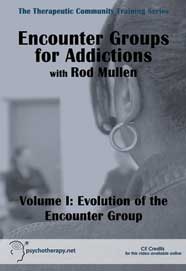 by Rod Mullen
by Rod Mullen
In this series, Rod Mullen creates a strong argument for how and why we need to keep the encounter group thriving. Illustrated with powerful and compelling vignettes from actual encounter groups, these videos explore how encounter groups have evolved, what we can do to improve groups and overcome pitfalls, and what the keys are to leading successful groups.
Full Description:
Encounter groups are at the heart of therapeutic communities. They demonstrate a break from traditional addiction counseling techniques and have been proven to be an effective and important means for change. However, institutional demands including increased paperwork and funding cuts have recently threatened the livelihood of encounter groups. In this DVD series, Rod Mullen creates a strong argument for how and why we need to keep the encounter group thriving. Illustrated with powerful and compelling vignettes from actual encounter groups, these videos explore how encounter groups have evolved, what we can do to improve groups and overcome pitfalls, and what the keys are to leading successful groups.
Volume 1: Evolution of the Encounter Group
Mullen explores the evolution of encounter groups beginning with the first groups created by Synanon founder Chuck Dederich in the 1950s. Mullen discusses the essential elements of these first groups including honesty, authenticity and mutual self-help—elements that are still core to encounter groups today. He highlights that although the brutal confrontational style of the first groups have softened, the commitment to hold oneself and other accountable remains central. He also discusses the challenges that face encounter groups and offers guidance on how to work within managed care systems while holding on to the traditions that make encounter groups such an effective means for change.
From watching this video, you'll be able to:
- Describe the most integral aspects of encounter groups that have remained relevant from the 1950s to the present.
-
Discuss the early history of encounter groups and how they came about.
-
Explain how encounter groups have changed over time, and how changes in the field during the last 20 years have posed significant challenges to running effective encounter groups.
Volume II: Pitfalls Solutions
Mullen walks us through several groups to show us what works and what does not work when facilitating an encounter group. He warns us of several traps facilitators can fall into: dominating the group, getting into power struggles, not being prepared or knowing the group members, and leading groups that are too large and don’t go deep enough. Through numerous vignettes, he illustrates solutions to these common problems, and offers words of experience and wisdom to the encounter group facilitator: know your people, be prepared, get feedback, and listen, listen, listen!
From watching this video, you'll be able to:
-
Implement strategies for breaking the we/they dichotomy between staff and group members.
-
Explain why it is important for a facilitator to know the members of his or her group and what the dangers are if they don't.
-
Compare the differences between large and small groups, the effectiveness of both, and ways to make them each work.
Volume III: Keys to Fostering Growth
Mullen discusses several key components to fostering growth and change in groups. He first explores the “marathon group” and how these day or weeklong sessions can bring participants into deeper understanding of themselves and what they need to change. He then discusses the importance of moral growth and ways in which facilitators can lead groups that foster moral growth by providing credible role models, healthy levels of conflict, role-reversal, and the teaching of responsibility. Finally, Mullen discusses the prevalence of PTSD among addicts and how encounter groups offer opportunities to heal from childhood abuse.
From watching this video, you'll be able to discuss:
-
Describe ways marathon groups differ from regular encounter groups, the importance of them for group members, and different possibilities for doing them today.
-
Discuss the conditions a facilitator must create to foster moral growth within group members.
-
Explain how PTSD increases a person’s risk for abusing drugs, and how trauma can be worked through in encounter groups.
Rod Mullen, President and CEO of Amity Foundation, has been working in therapeutic communities since 1967. Rod has written numerous articles and book chapters, produced a number of video projects about therapeutic communities, and presented at numerous state, national and international meetings and conferences.
ONLINE STREAM 3 hrs. 35 min
Stock: EMAIL LINK WILL BE SENT TO ONLINE STREAM FOR INSTITUTIONS.
|